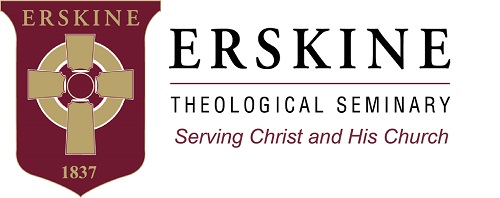Navy Reserve Chaplain Adam Erwin ’16, pictured above, now a lieutenant commander, describes what might be…

Work with refugees enriches church-planting ministry
“We never expected that our church-planting ministry would offer us so many opportunities for refugee relief,” says Mark Witte, a graduate of Erskine Theological Seminary and pastor of Iglesia Cristiana Presbiteriana (ICP) in Toledo, Spain. Witte and his wife Natalie, who is from Ukraine, “never imagined that we would have family members living in our house as refugees!”
Long before the invasion of Ukraine captured the world’s headlines in February 2022, and just two months after ICP began weekly worship services in May 2017, the congregation welcomed its first Ukrainian refugees, a single mother and her teenage son fleeing Crimea.
“She and her son were placed in Toledo, where my wife Natalie met them while volunteering as a translator for a local NGO.” Six months later, that single mother, after hearing sermons translated and participating in a discipleship class, “became the first person in Toledo to join the church.”
In 2018, the fledgling congregation welcomed several other families of Ukrainian refugees, and, Witte adds, “At the same time, we welcomed several families and individuals who came from Venezuela seeking political asylum.”
During the COVID-19 pandemic, many refugees in Toledo “lost the little work they had,” Witte says, but “received little government aid.” In view of the refugees’ situation, “about twice a month, I was able to use ARP Church funds which had been donated to World Witness to purchase food and supplies for six families connected to the church.”
As the news from Ukraine grew more alarming, the Wittes were concerned about Natalie’s family. “When the expansion of the war seemed imminent, we were actively encouraging her family to come to Spain,” Witte recalls. But Natalie’s sister and brother-in-law were hesitant.
Meanwhile, thanks to the congregation’s experience with refugees beginning in 2017, ICP was ahead of the curve. “We were ready to receive refugees and knew a bit of what it entailed.”
Natalie’s sister and family, along with three other families who fled with them, left Ukraine as bombs began falling 10 miles from their homes. They became the first 17 refugees after the invasion to arrive in the city of Toledo. “They had come so fast that the Spanish government and aid agencies did not yet know what to do with them,” Witte says.
The congregation “stepped in and found housing for them among church members and neighbors,” Witte says. “Using funds that were later donated to the World Witness Ukrainian Refugee Relief fund, we were able to provide meals, clothing, and medicine for them.”

Witte says the church has collected “several tons of clothing” and distributed it to refugees in Toledo. “Whatever is left over, we ship to churches in Ukraine to help the internally displaced people,” he says.
“We have seen much generosity, not only within the church, but also in the community. Many people have brought clothing, supplies, and money to us because they trust us to ensure their delivery to refugees in Spain and people in Ukraine. The local newspaper even highlighted our work on various occasions.”

Working week by week with refugees, Natalie Witte and a Ukrainian friend who has lived in Spain for 20 years take turns serving as translators of the worship service at ICP. They also use an FM transmitter which works with a microphone, Mark Witte says, to “broadcast sermons to handheld radios tuned in to the channel.”
ICP’s refugee work has developed over time, the pastor says. “Initially, our help was mostly translation, food, clothing, and medicine. We also sought to provide a place for the Ukrainian believers to worship God, and where non-believers could hear the gospel.”
As needs among the refugees have changed, so has ICP’s work. “As we move forward, many refugees are being moved out of the hotels and assisted living centers and are given apartments. Now we are helping find furniture and warm blankets,” Witte says. More refugees have needed medical care, and the church can help pay for their medicines.
“This Christmas, we are collecting gifts which we will be sending to two orphanages in Ukraine. Natalie’s friend and her friend’s church work with [these orphanages] and it is our desire to bless them this Christmas and provide them with another reminder of the love and mercy of God,” Witte says, adding a prayer “that in the cold and dark winter, they would see a glimpse of the light of our Lord.”
As Mark Witte looks back on the last several years, he sees the Lord’s hand at work.
“There are some things that seminary and Sunday school never prepare you for,” he admits. “But, through my studies at Erskine Theological Seminary, God prepared me and my family for the ministry that is before us.”
The Wittes have heard refugees’ stories of “situations so sad and hard that you can never talk about them with others,” but as the war goes on, they persevere.
“Our only hope is knowing that God reigns and that He is sovereign. His Providence is perfect. And every time we help a brother or a stranger, we are glorifying God and proclaiming His love to the world.”
The Rev. Mark G. Witte, a graduate of the State University of New York, received the Master of Arts in Theological Studies (MATS) in 2008 and the Master of Theology (Th.M.) in 2011 at Erskine Theological Seminary. He and his wife Natalie, who holds a B.A. in Linguistics from the Ukrainian National Linguistic University, serve with World Witness in Toledo, Spain, where they reside with their three children. The family is pictured at the top of the page.


